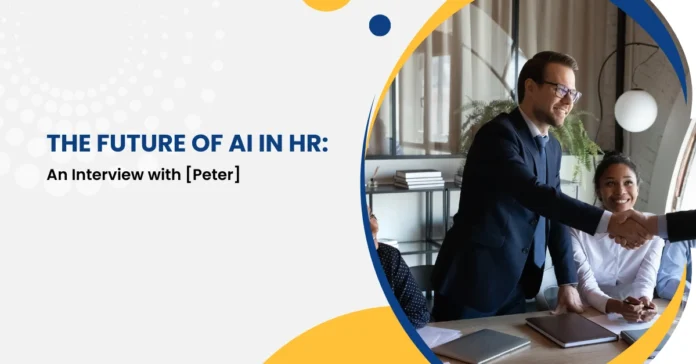Interviewer: Today, we have Peter, a leader in HR technology, to share his insights on how AI is shaping the future of human resources. Welcome, Peter!
Peter: Thank you! I’m excited to discuss how AI is revolutionizing HR.
1. How AI is Transforming Recruitment
Interviewer: Let’s start with recruitment. How is AI transforming the hiring process?
Peter: AI is changing recruitment by making the process more efficient, data-driven, and less biased. AI tools now handle tasks like resume screening, candidate matching, and even preliminary interviews through chatbots.
Real-time Example:
Take Unilever, for instance. They use an AI-powered system that screens applicants by evaluating their resumes, conducting initial interviews through video, and using facial recognition software to assess candidates’ personalities and fit. This has helped Unilever cut recruitment time by 75%.
2. AI for Employee Engagement and Retention
Interviewer: Beyond recruitment, how is AI helping with employee engagement and retention?
Peter: AI is playing a crucial role in understanding employee behavior. Tools that use AI to track employee sentiment through surveys or analyze performance data can alert HR managers to potential issues, helping them take proactive measures.
Real-time Example:
IBM’s Watson uses AI to predict employee turnover with 95% accuracy. It analyzes various factors such as job satisfaction, performance, and personal circumstances to flag at-risk employees. This has allowed companies to implement targeted interventions, reducing turnover rates.
3. AI’s Role in Diversity and Inclusion
Interviewer: Diversity and inclusion are key areas of focus for many organizations today. How can AI support these efforts?
Peter: AI helps mitigate bias in the hiring process. By using data-driven algorithms, AI can ignore unconscious biases that humans may have. Additionally, AI tools can track diversity metrics and highlight areas that need improvement.
Real-time Example:
At Intel, AI-powered systems ensure diverse representation by removing identifying information such as gender and race from applications, focusing solely on skills and experience. This has helped Intel improve its diversity in hiring by 43% over the past few years.
4. AI for Learning and Development
Interviewer: What about employee training and development? How does AI fit in there?
Peter: AI can provide personalized learning experiences based on employee skill gaps, interests, and career paths. It tracks employee progress and suggests new learning opportunities, making continuous education more dynamic.
Real-time Example:
Cornerstone OnDemand uses AI to personalize learning content for employees based on their roles, career goals, and skill sets. This not only enhances employee growth but also aligns with organizational goals by filling key skill gaps.
5. Challenges of AI in HR
Interviewer: With all these advantages, what challenges do companies face in adopting AI for HR?
Peter: One major challenge is data privacy. As AI systems rely on vast amounts of employee data, companies must ensure they comply with regulations like GDPR to avoid misuse or breach of sensitive information. Additionally, there is the challenge of ensuring AI doesn’t perpetuate biases hidden within the data it’s trained on.
6. Future Outlook: What’s Next for AI in HR?
Interviewer: Looking ahead, where do you see AI in HR heading in the next 5 to 10 years?
Peter: AI will continue to evolve, especially in predictive analytics. Soon, AI will not just predict who might leave but suggest strategies to retain those employees. We will also see a rise in AI-driven workforce planning, helping companies anticipate and prepare for future workforce needs.
Real-time Example:
For example, companies like LinkedIn already use AI to forecast talent needs and align recruitment efforts with long-term business strategies. Over time, this capability will become more refined and widespread.
Interviewer: Thank you, Peter, for these valuable insights into the future of AI in HR! It’s clear that AI will continue to shape HR practices in the years to come.
Key Takeaways:
- Efficiency in Recruitment: AI automates resume screening, candidate matching, and even initial interviews.
- Employee Engagement: AI helps monitor employee sentiment and predicts turnover, allowing proactive engagement.
- Diversity and Inclusion: AI tools reduce unconscious bias in hiring and track diversity metrics.
- Personalized Learning: AI-driven learning platforms tailor content to individual employee needs, enhancing development.
- Challenges: Data privacy and bias remain significant challenges in adopting AI for HR.
- Future Trends: AI will advance in predictive analytics, helping with employee retention and workforce planning.

